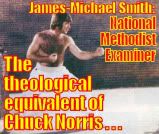Some of you may remember that I've been reading the late G.B. Caird's "New Testament Theology" (here's my initial post on it). I bought it years ago when I saw it on sale for 50% off in a bookstore and it sat on my shelf until I recently picked it back up for some unknown reason.
That reason may well have been the prompting of the Holy Spirit...because this is the most refreshing and insightful book I've read on the NT in...well...ever!
I should be clear that this doesn't mean I always agree with Caird's conclusions. But despite occasional areas of difference, I was simply blown away by how much Caird brings out of the NT's teaching as a whole and if I were a professor I would have this on my required reading list.
Here is, in my opinion, one of the best passages in the entire book as far as summary goes. It comes from the last two paragraphs of the last chapter of the book:
Thus we come to the end of our journey. For Jesus, Israel had been called to be the saved and saving nation, the agent through whom God intended to assert His sovereignty over the rest of the world; the time had arrived when God was summoning the nation once and for all to take its place in His economy as the Son of Man. If the nation would not listen, it must pay the price; but at least Jesus, and anyone else who would share it with him, must fulfill the national destiny. The light to the Gentiles, the Son of Man coming on the clouds of heaven, the son who clings to his Father for his very life, the king who ransoms the people for whom he must stand as surety, and the servant who dies for the many, fill out his picture of Israel as God intended it to be. So deeply does he love his nation, so fully is he identified with its life, so bitterly does he regret what he sees coming upon it, that only death can silence his reiterated and disturbing appeal. He goes to his death at the hands of a Roman judge on a charge of which he was innocent and of which his accusers, as the event proved, were guilty. And so, not only in theological truth but in historic fact, the one bore the sins of the many, confident that in him the entire Jewish nation was being nailed to the Cross, only to come to life again in a better resurrection, and that the Day of the Son of Man which would see the end of the old Israel would also see the vindication of the new.If anyone is looking for a summary of the New Testament's teaching, particularly focused on the person and work of Jesus, Caird's "New Testament Theology" should be at the top of your resource list. It's worth every penny of its admittedly hefty pricetag! (Though you can find it for half, or even a third of print cost here)
And if the theology of the New Testament began with ways in which Jesus thought and spoke about himself and his people, it was precisely because, as the agent appointed by God to be the fulfillment of Israel's destiny, he later came to be recognized, first as the fulfiller of the destiny of the human race, and then, in consequence, as the bearer of a more-than-human authority and the embodiment of a more-than-human wisdom.







2 comments:
Hey JM!
I'm reading NT Wright's "Jesus and the Victory of God" and he keeps referring to Caird as one of the few scholars who had anything to say that moves in the direction of what Wright himself says. This is definitely the best book on the NT I have ever read. I feel like Wright has handed me a pair of 3-D glasses and I'm seeing the depth of the NT ... really ... for the first time. I'm glad to know about Caird's work as well. They sound very similar! If you haven't read Wright's book it should be next on your list! Wow!
Oh yeah, Carmen, JVG is a must-read for ANYONE studying Jesus. Caird's book is wider in scope, but not nearly as detailed (which makes it about half the length of Wright's!). I've learned more from those two books than probably all the other books on the NT I've ever read combined...and that's no exaggeration!
Post a Comment